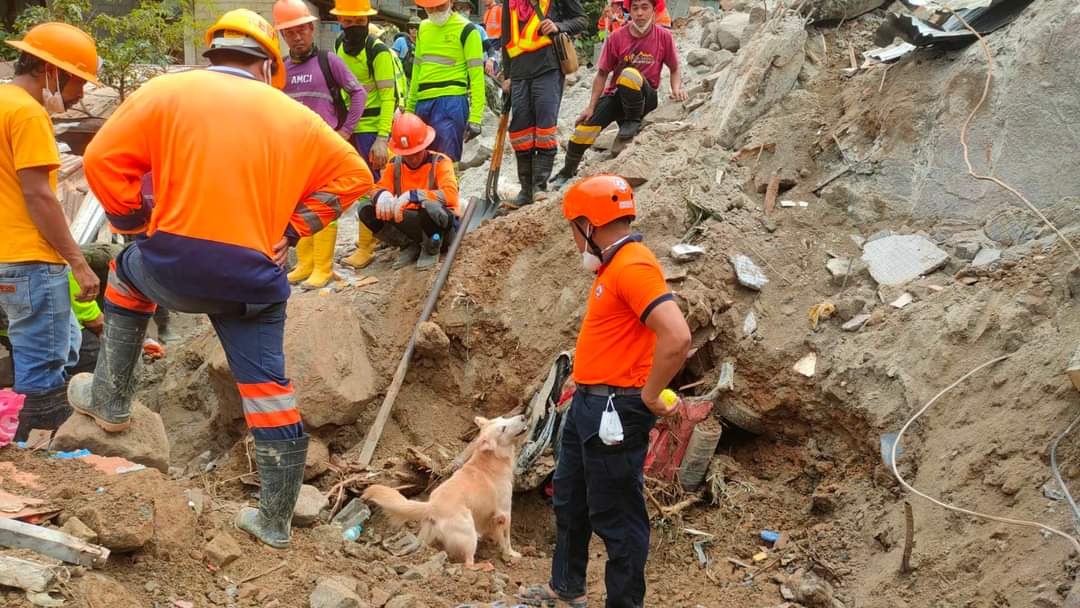How PCG dog 'Appa' helped in rescue of 3-year-old landslide survivor in Davao de Oro

A dog is not only a man's best friend, at times it is also its savior.
Such is the case for "Appa", a Philippine Coast Guard working dog, whose exceptional tracking abilities resulted in the safe rescue of three-year-old Chin-Chin Malacaste after the girl was trapped underground for 60 hours when a landslide hit Brgy. Masara, Maco, Davao de Oro last Friday, Feb. 6.
"We had the dog from the coast guard called Appa. The dog was the one who detected someone was alive there so the little girl was found. Thankfully, she was [rescued] safely," Davao de Oro Governor Dorothy Montejo-Gonzaga said in a press briefing on Saturday, Feb. 10.
Appa to the rescue
Chin-Chin was having dinner with her mother Tata, father Lando, and sister Shaira around 7:30 p.m. on Feb. 6 when they heard a loud rumbling noise outside.
For the past week, Davao de Oro and other parts of Mindanao were battered by heavy rains due to the trough of a low pressure area (LPA) and northeast monsoon (amihan), which saturated the soil where their house was built.
Moments later, the Malacaste family rushed outside of their house only to find out that a landslide was about to hit their village of 326 households.
There was very little time to react. First to go out was Chin-Chin, her mother, and sister but before they could get to safety, piles of rock, soil and debris had already enveloped them. The father managed to evade the landslide as he got out a second late.
An iron sheet pinned little Chin-Chin but it also provided pockets of air which enabled her to breathe oxygen.
"When she was rescued, there was a yero (galvanized iron sheet) over her so there was a vacuum of air for her. There was a pocket or space for her," Gov. Gonzaga said.
When the news of the landslide reached the Philippine Coast Guard, personnel of the Coast Guard District Southeastern Mindanao immediately joined other responders to conduct search, rescue, and retrieval operation in hopes of finding survivors.
The PCG personnel brought search and rescue equipment, and most importantly, Appa, their trusted tracker dog.
Equipped with unmatched keen sense of smell and agility in traversing the challenging terrain of the landslide site, Appa was able to locate Chin-Chin around 7:30 a.m. on Feb. 9.
Chin-Chin was covered in mud and had wounds on the different parts of the body so she was rushed to a hospital.
"Right now, she is very agile and very stable. But she had to be transferred to the DRMC [Davao Regional Medical Center] because a lump was found on her stomach," Governor Gonzaga said.
Meanwhile, the work for Appa continued at the ground zero.
Over the course of four days, Appa found three more cadavers (two male and one female) and a body part belonging to an unidentified individual.
At present, a total of 28 bodies were retrieved by search and rescue personnel while 77 others remained unaccounted for.
The period for search and rescue operation was quickly coming to an end before it turns to retrieval operations.
"In the first 48 hours, we're always hopeful we can get alive persons where the rubbles are. After 48 hours, we are now considering it search, rescue, and retrieval because at this point in time, there are some concerns in the area that we need to consider. We start getting dead bodies," said Davao de Oro provincial disaster risk reduction and management officer (PDRRMO) Joseph Randy Loy.
"Still yesterday, we were able to rescue the young girl from the rubbles. We are still hoping that a lot of people are still alive. In fact, most of the ones we rescued alive are children. We are still hoping for more to be saved even at the fourth day of the operation," he added.
The chance of survival depends on where the victims of the landslide ended up, according to the PDRRM officer.
"Sometimes there are so called 'pockets' in rubbles that would allow them to breathe for days. As to the extent of how long this oxygen will be able to supply them, it depends on the situation underground," Loy shared.
"There is no hard and fast rules that would say at this time, the situation would be like this. It depends on where they are buried," he said.